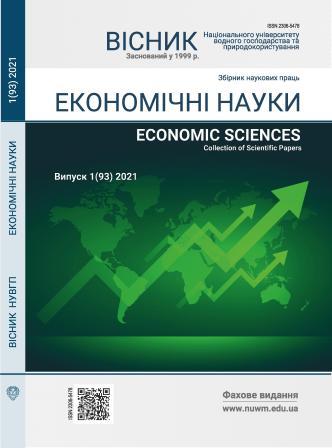HANDLING OF BY-PRODUCTS IN THE ECONOMY: BUSINESS PROCESSES IN THE CONTEXT OF EUROPEAN INTEGRATION
DOI:
https://doi.org/10.31713/ve1202117Keywords:
solid household waste, handling of by-products, economic efficiency, business processes, European integration.Abstract
World best practices and institutions (UN, UNIDO and UNEP) believethat resource-efficient and cleaner production is the path to a circulareconomy and waste management. Harmonization of laws and standards in Ukraine involves the use of preventive strategies for all types of waste that increase the efficiency of the economy, form social and environmental significance. The article is devoted to waste prevention and waste management and corresponds to the Directive 2008/98 / EC on waste to be produced in Ukraine by: reducing the amount of waste, reducing the adverse effects of waste on the environment and human health; implementation of the National Waste Management Strategy in Ukraine until 2030. Promising for Ukraine are: sorting of waste with their subsequent processing; formation of online plans for waste collection and logistics; certain types of toxic and medical waste management; prevention of waste incineration and disposal of only a part of waste that cannot be recycled. One of the options for digitalization of waste management can be a tool – information and communication platforms in the regions (communities) in the methodology at the global level which is the Platform for Green Growth. Proposals for harmonization of legal and regulatory documents in the field of environmental management should be considered in two aspects: long-term and short-term. The long-term aspect of the concept is related to the desire to form in the future a theoretically sound and practically effective mechanism for internalizing external costs, as well as ensuring environmentally safe and economically feasible development. The shortterm aspect is designed to consolidate in legislative and regulatory form the international experience of greening the country's economy in order to protect the environment from the negative anthropogenic impact.References
Сталий розвиток – ХХІ століття: управління, технології, моделі : колективна монографія / М. Ф. Аверкина, Н. М. Андрєєва, М. Д. Балджи, О. О. Веклич та ін. НАН України, ДУ «Інститут економіки природокористування та сталого розвитку НАН України»; НТТУ «Київський політехнічний інститут»; Вища економіко-гуманітарна школа; Міжнародна асоціація сталого розвитку ; за наук. ред. проф. Хлобистова Є. В. Черкаси : Видавець Чабаненко Ю. А., 2014. С. 170–181.
Войціховська А., Кравченко О., Мелень-Забрамна О., Панькевич М. Кращі європейські практики управління відходами : посібник / за заг. ред. О. Кравченко. Львів : Видавництво «Компанія “Манускрипт”», 2019. 64 с.
Про внутрішнє і зовнішнє середовище в Україні у 2013 році: щорічне послання Президента України до Верховної Ради України. К. : НІСД, 2013. 576 с.
Державна служба статистики України. URL: http://www.ukrstat.gov.ua/ (дата звернення: 03.02.2021).

